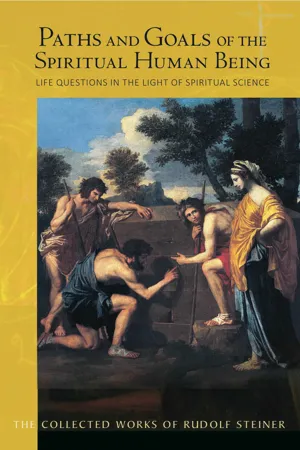
Paths and Goals of the Spiritual Human Being
Life Questions in the Light of Spiritual Science
- 296 pages
- English
- ePUB (mobile friendly)
- Available on iOS & Android
Paths and Goals of the Spiritual Human Being
Life Questions in the Light of Spiritual Science
About this book
Speaking to audiences in Denmark, Germany and France, Rudolf Steiner discusses a wide range of topics: from positive and negative human soul capacities, true self-knowledge and karma, to changes in human consciousness, from ancient times to the modern era – all in the context of the incarnation of Christ on earth.The lectures illustrate the diversity of Steiner's approach when speaking to different audiences. Reflecting on the polymath Novalis, for example, he is urgent about the responsibility of spiritual science to help humanity awaken to the new age. A few months later, talking of Hegel and deploring the fact that an interest in spiritual matters often fails to be accompanied by an equal interest in logical thought, Steiner uses a dispassionate, philosophical tone. But throughout the lectures he is consistent in his view that spiritual science does not reject conventional science. Trained philosophical thinking leads to different conclusions than materialism, he says, but there is nothing in the field of spiritual science that need be rejected by rigorous scientific thought.Although the lectures were given to a variety of audiences, ideas recur from different perspectives and in different contexts, with strong thematic links binding them together. These include the relationship between philosophy and science; the nature of clairvoyance; Christ's presence in the etheric realm; reincarnation and karma; the mystery drama The Portal of Initiation; Christmas and its symbols; and the transformation of consciousness that occurred when Christ incarnated physically on earth.In the final lectures, Rudolf Steiner speaks inspiringly about the Christmas festival, contrasting the feeling of inwardness that people used to experience with the hectic cultural environment of modern cities. However, this does not lead Steiner to be nostalgic about the past. Rather, he states, we should seek to recreate a mood of inwardness in a new way, appropriate to our modern age and consciousness. These lectures give us the tools to bring such a contemporary spiritual approach to our lives.
Frequently asked questions
- Essential is ideal for learners and professionals who enjoy exploring a wide range of subjects. Access the Essential Library with 800,000+ trusted titles and best-sellers across business, personal growth, and the humanities. Includes unlimited reading time and Standard Read Aloud voice.
- Complete: Perfect for advanced learners and researchers needing full, unrestricted access. Unlock 1.4M+ books across hundreds of subjects, including academic and specialized titles. The Complete Plan also includes advanced features like Premium Read Aloud and Research Assistant.
Please note we cannot support devices running on iOS 13 and Android 7 or earlier. Learn more about using the app.
Information
Table of contents
- Editor's Preface
- Introduction, by Christian von Arnim
- LECTURE 1 STRASBOURG, 23 JANUARY 1910 ON THE INAUGURATION OF THE NOVALIS BRANCH
- LECTURE 2 HAMBURG, 26 MAY 1910
- LECTURE 3 COPENHAGEN, 2 JUNE 1910 (FIRST LECTURE)
- LECTURE 4 COPENHAGEN, 4 JUNE 1910 (SECOND LECTURE)
- LECTURE 5 COPENHAGEN, 5 JUNE 1910 (THIRD LECTURE)
- LECTURE 6 MUNICH, 26 AUGUST 1910
- LECTURE 7 BASEL, 17 SEPTEMBER 1910
- LECTURE 8 BERLIN, 31 OCTOBER 1910
- LECTURE 9 NUREMBERG, 13 NOVEMBER 1910
- LECTURE 10 LEIPZIG, 21 NOVEMBER 1910
- LECTURE 11 BREMEN, 26 NOVEMBER 1910
- LECTURE 12 MUNICH, 11 DECEMBER 1910
- LECTURE 13 BERLIN, 22 DECEMBER 1910
- LECTURE 14 STUTTGART, 27 DECEMBER 1910
- Notes
- Rudolf Steiner's Collected Works
- Significant Events in the Life of Rudolf Steiner